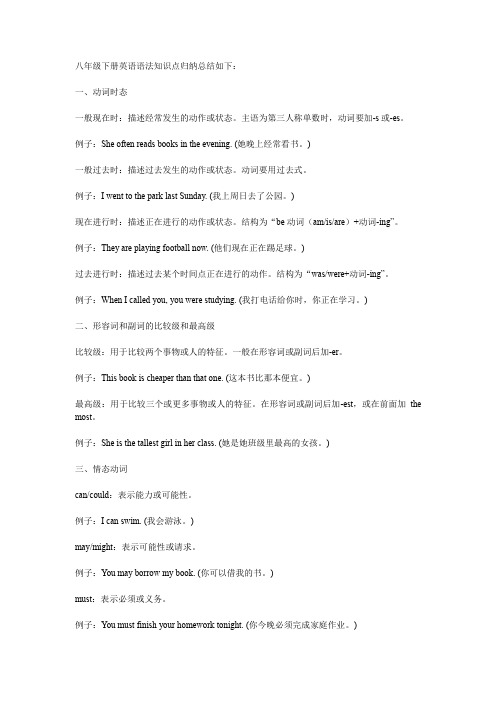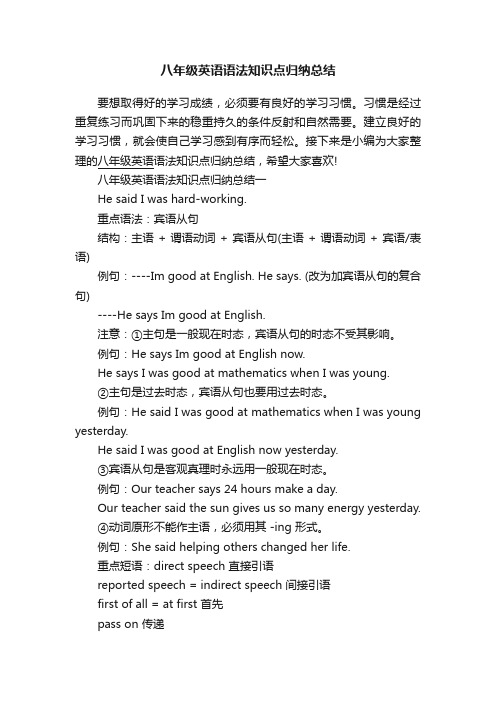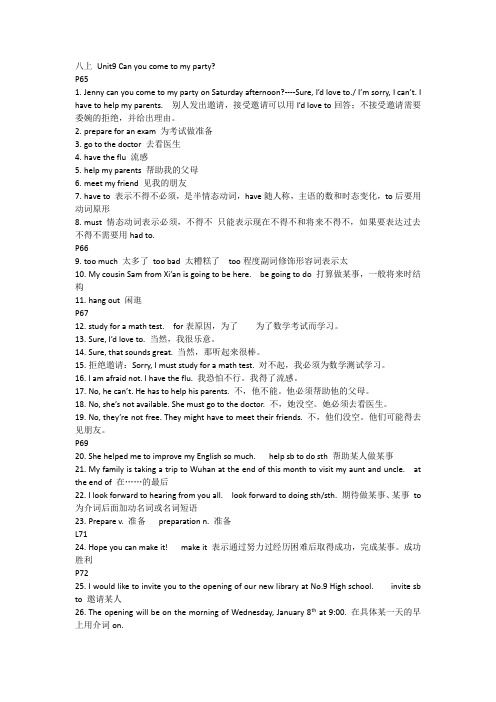八年级英语知识点整理
人教版八年级上册英语语法、短语和知识点总结归纳

人教版八年级上册英语语法、短语和知识点总结归纳一、语法1. 一般现在时- 用法:表示经常性或惯性的动作或状态。
- 结构:主语 + 动词原形 (+ 其他成分)- 示例:I play soccer every weekend.2. 一般过去时- 用法:表示过去某个时间点或一段时间内发生的动作或存在的状态。
- 结构:主语 + 动词过去式 (+ 其他成分)- 示例:She watched a movie last night.3. 现在进行时- 用法:表示现在正在发生的动作。
- 结构:主语 + am/is/are + 动词-ing (+ 其他成分)- 示例:They are studying for the exam.4. 现在完成时- 用法:表示动作或状态发生在过去某个时间点,但与现在有关。
- 结构:主语 + have/has + 动词过去分词 (+ 其他成分)- 示例:I have finished my homework.5. 情态动词- 用法:表示能力、意愿、可能性等。
- 常见的情态动词有 can, could, may, might, must, should, ought to 等。
- 示例:He should go to bed early.二、短语1. as well as- 用法:表示两个事物同时存在或发生。
- 示例:She can speak English as well as Chinese.2. in order to- 用法:为了做某事。
- 示例:They woke up early in order to catch the train.3. by the way- 用法:用于引入一个新的话题或问题。
- 示例:By the way, have you seen the latest movie?三、知识点1. 直接引语和间接引语- 直接引语:用引号括起来的原话。
- 间接引语:将直接引语转述为陈述句或疑问句。
八年级下册英语语法知识点归纳总结

八年级下册英语语法知识点归纳总结如下:一、动词时态一般现在时:描述经常发生的动作或状态。
主语为第三人称单数时,动词要加-s或-es。
例子:She often reads books in the evening. (她晚上经常看书。
)一般过去时:描述过去发生的动作或状态。
动词要用过去式。
例子:I went to the park last Sunday. (我上周日去了公园。
)现在进行时:描述正在进行的动作或状态。
结构为“be动词(am/is/are)+动词-ing”。
例子:They are playing football now. (他们现在正在踢足球。
)过去进行时:描述过去某个时间点正在进行的动作。
结构为“was/were+动词-ing”。
例子:When I called you, you were studying. (我打电话给你时,你正在学习。
)二、形容词和副词的比较级和最高级比较级:用于比较两个事物或人的特征。
一般在形容词或副词后加-er。
例子:This book is cheaper than that one. (这本书比那本便宜。
)最高级:用于比较三个或更多事物或人的特征。
在形容词或副词后加-est,或在前面加the most。
例子:She is the tallest girl in her class. (她是她班级里最高的女孩。
)三、情态动词can/could:表示能力或可能性。
例子:I can swim. (我会游泳。
)may/might:表示可能性或请求。
例子:You may borrow my book. (你可以借我的书。
)must:表示必须或义务。
例子:You must finish your homework tonight. (你今晚必须完成家庭作业。
)四、被动语态被动语态用于描述事物的状态或描述被动发生的动作。
结构为“be动词(am/is/are/was/were)+动词的过去分词”。
八年级英语语法知识点归纳总结

八年级英语语法知识点归纳总结要想取得好的学习成绩,必须要有良好的学习习惯。
习惯是经过重复练习而巩固下来的稳重持久的条件反射和自然需要。
建立良好的学习习惯,就会使自己学习感到有序而轻松。
接下来是小编为大家整理的八年级英语语法知识点归纳总结,希望大家喜欢!八年级英语语法知识点归纳总结一He said I was hard-working.重点语法:宾语从句结构:主语 + 谓语动词 + 宾语从句(主语 + 谓语动词 + 宾语/表语)例句:----Im good at English. He says. (改为加宾语从句的复合句)----He says Im good at English.注意:①主句是一般现在时态,宾语从句的时态不受其影响。
例句:He says Im good at English now.He says I was good at mathematics when I was young.②主句是过去时态,宾语从句也要用过去时态。
例句:He said I was good at mathematics when I was young yesterday.He said I was good at English now yesterday.③宾语从句是客观真理时永远用一般现在时态。
例句:Our teacher says 24 hours make a day.Our teacher said the sun gives us so many energy yesterday.④动词原形不能作主语,必须用其 -ing 形式。
例句:She said helping others changed her life.重点短语:direct speech 直接引语reported speech = indirect speech 间接引语first of all = at first 首先pass on 传递be supposed to do sth. 应该做某事be good at = do well in 在某方面做得好in good health 身体健康get over 克服open up 打开care for = take care of = look after 照料;照顾not any more = not any longer = no longer 不再have a cold 感冒end-of-year exam 年终考试get nervous 变得紧张forget to do sth. 忘记做某事(该事未做)forget doing sth. 忘记做某事(该事已做)its + adj. + [for sb.] + to do sth. 做某事[对某人来说](加形容词) context 上下文Reading Strategy(阅读方法)First read for meaning, not for detail. (首先理解文段的大致意思,不在于文段的细节部分。
人教版八年级下英语单元语法知识点汇总(经典)

Unit 1 What’s the matter?一、询问某人的健康问运及遭到麻烦的表达方法(1)询问某人患了何种疾病或遇到了何种麻烦时,常用以下几种结构来表达:What’s the matter(with sb.)?(某人)怎么了?What’s wrong(with sb.)?(某人)怎么了?What’s the trouble(with sb.)?(某人)出什么事了?What happened(to sb.)?(某人)发生了什么事?Are you OK?你没事吧?Is there anything wrong with sb.?某人有什么事吗?(2)要表达身体疼痛或不舒服,可用以下结构:①某人+have/has+病症.The twins have colds.双胞胎感冒了。
某人+have/has+a+headache/toothache/stomachache/backache/earache.She had a stomachache last night.她昨晚肚子痛。
③某人+have/has+a+sore+发病部位.He has a sore throat.他喉咙痛。
④某人+hurt(s)+身体部位或反身代词.He hurt his leg.他的腿受伤了。
⑤某部位+hurt(s).My head hurts badly.我头痛得厉害。
⑥某人+have/has+a pain+in one’s+身体部位,I have a pain in my chest.我胸口痛。
⑦(There is)something wrong with one’s+身体部位.There is something wrong with my right eye..我的右眼有毛病。
⑧其他表达方式She has a heart trouble.她有心脏病。
He got hit on the head他头部受到了撞击。
She cut her finger.她割破手指了。
八年级下英语unit2短语知识点整理总结

⼋年级下英语短语unit2英语短语1. visit sick kids in the hospital 看望医院⽣病的孩⼦2. volunteer in an after - school study program to teach kids ⾃愿在课后学习项⽬甲教孩⼦们3. help homeless people 帮助⽆家可児的⼈4. help disabled people 帮助残疾⼈5. help stop hunger帮助阻⽌饥饿6. work outside 出去⼯作7. clean up 打扫⼲净8. cheer up 变得更⾼兴,振奋起来9. put up 张贴, 搭建, 举起, 盡起10. call up 打电话给(某⼈);征召11. give up 放弃12. set up 建起;设⽴13. give away 赠送,捐赠14. give/hand out 分发,散发15. help out 帮助…脱困境16. come up with = think up 想出;提出17. put off 推迟18. used to do sth 过去常常做某事19. be /get used to doing sth 习惯于做某事20. run out of = use up ⽤尽,耗尽21. listen to sb倾听某⼈22. care for 照顾,关爱:喜欢~23. get such a strong feeling of satisfaction 获得如此强烈的满⾜感24. by oneself 某⼈⾃⼰、单独、独⾃25. at the age of 在…岁时26. try out for sth 参加…洗抜;试⽤27. go on a different journey 踏上不同的旅程28. come true 实现29. I can do what I love to do 我可以做我所喜爱做的事情30. at the same time 同时31. help others 帮助別⼈32. be busy with sth 忙于某事33. at least ⾄少34. be worried about = worry about 为......担⼼35. in one's free time 在某⼈空闲时间⾥36. raise money 筹集资⾦37. feel lonely 感到孤単38. travel alone ⼀个⼈旅游39. hope to do sth 希望做某事40. need to do sth 需要做某事41. decide to do 决定做其事42. want/would like to do sth 想要做某事43. learn to do sth 学会做某事44. volunteer to do sth ⾃愿做某事45. expect to do sth 期待做某事46. be able to do sth 能够做某事47. feel lucky (adj.) to do sth 做某事感到幸运48. make plans to do sth 制定计划做某事49. plan to do sth 计划做某事50. ask sb.(not) to do sth 要求某⼈(不)做某事51. tell sb. (not) to do sth 告诉某⼈(不)做某事52. expect sb.(not) to do sth 期待某⼈(不)做某事53. take after (外貌或⾏为)像54. be similar to 和……相似55. fix up 修理,维修56. broken bicycle parts 破损的⾃⾏⻋部件57. write (a letter) to sb 给某⼈写信58. would like to do sth 想要做某事59. thank sb. for doing sth 为做了某事感谢某⼈60. set up 建⽴,设⽴61. help disabled people. 帮助残疾⼈62. make it possible for sb to do sth 对某⼈来说使做某事成为可能63. make a big difference to my life 对我的⽣活有很⼤的影响64. have difficulty in doing sth 做某事有困难65. normal things 正常的事情66. a friend of mine 我的⼀个朋友67. help sb out 帮助某⼈脱离困境68. get me a special trained dog 给我⼀只受过特别训练的狗69. be excited about doing sth 对做某事感到激动70. after six months of training 六个⽉的训练之后71. be able to do sth 能够做某事72. feel lucky to do sth 做某事感到很幸运73. because of your kindness 由于你的善良74. give sb orders 给某⼈发出指令75. send you a photo of him 给你寄⼀张他的照⽚76. change my life 改变我的⽣活77. be interested in 对……感兴趣78. interests and hobbies 兴趣和爱好79. be free to do sth 有空做某事80. volunteer as a guide ⾃愿做⼀名导游81. be good at = do well in = be strong in 擅⻓82. ask for old bikes 寻求旧⾃⾏⻋83.work out fines 很有效84. give away sth to sb 把某物捐赠给某⼈。
人教版英语八年级上第九单元知识点整理

八上Unit9 Can you come to my party?P651.Jenny can you come to my party on Saturday afternoon?----Sure, I’d love to./ I’m sorry, I can’t. I have to help my parents. 别人发出邀请,接受邀请可以用I’d love to回答;不接受邀请需要委婉的拒绝,并给出理由。
2.prepare for an exam 为考试做准备3.go to the doctor 去看医生4.have the flu 流感5.help my parents 帮助我的父母6.meet my friend 见我的朋友7.have to 表示不得不必须,是半情态动词,have随人称,主语的数和时态变化,to后要用动词原形8.must 情态动词表示必须,不得不只能表示现在不得不和将来不得不,如果要表达过去不得不需要用had to.P669.too much 太多了too bad 太糟糕了too程度副词修饰形容词表示太10.My cousin Sam from Xi’an is going to be here. be going to do 打算做某事,一般将来时结构11.hang out 闲逛P6712.study for a math test. for表原因,为了为了数学考试而学习。
13.Sure, I’d love to. 当然,我很乐意。
14.Sure, that sounds great. 当然,那听起来很棒。
15.拒绝邀请:Sorry, I must study for a math test. 对不起,我必须为数学测试学习。
16.I am afraid not. I have the flu. 我恐怕不行。
我得了流感。
17.No, he can’t. He has to help his parents. 不,他不能。
人教版八年级下册英语必考知识点梳理(期末复习必备)
人教版八年级下册英语必考知识点梳理(期末复习必备)八年级下册英语知识点Unit 1 What’s the matter?【重点短语】1.have a fever 发烧2.have a cough 咳嗽3.have a toothache 牙疼4.talk too much 说得太多5.drink enough water 喝足够的水6.have a cold 受凉;感冒7.have a stomachache 胃疼8.have a sore back 背疼9.have a sore throat 喉咙痛10. take risks 冒险11.hot tea with honey 加蜂蜜的热茶12.see a dentist 看牙医13.get an X-ray 拍X 光片14.take one’s temperature 量体温15.put some medicine on sth. 在……上面敷药16. give up 放弃17. sound like 听起来像18. all weekend 整个周末19. in the same way 以同样的方式20. go to a doctor 看医生21. go along 沿着……走22. on the side of the road 在马路边23. shout for help 大声呼救24. without thinking twice 没有多想25. get off 下车26. have a heart problem 有心脏病27. to one’s surprise 另某人惊讶的是28. thanks to 多亏了;由于29. in time 及时30. make a decision 做出决定31. get into trouble 造成麻烦32. right away 立刻;马上33. because of 由于34. get out of 离开;从……出来35. keep on doing sth. 继续或坚持做某事36. put a bandage on sth. 用绷带包扎37. fall down 摔倒38. feel sick 感到恶心39. have a nosebleed 流鼻血40. cut his knee 割伤他的膝盖41. put her head back 把她的头向后仰42. have problems breathing 呼吸困难43. mountain climbing 登山运动44. be used to doing sth. 习惯做某事45. run out (of) 用完;用尽46. so that 以便47. so...that... 如此……以至于...…48. be in control of 掌管;管理49. in a difficult situation 在闲境中【重点句型】1. What's the matter with you?= What'the trouble with you? = What's wrong with you? 你怎么了?2. What should she do? 她该怎么办呢?3.Should I take my temperature? 我应该量一下体温吗?4.You should lie down and rest. 你应该躺下休息一会儿。
八下英语知识点总结
八下英语知识点总结八年级下学期的英语知识点主要包括语法、词汇、阅读理解和写作等方面。
下面我将分别对这些知识点进行总结。
一、语法1. 时态在八年级下学期,我们学习了一般现在时、一般过去时、一般将来时、现在进行时、过去进行时、过去将来时、现在完成时等时态。
要注意各个时态的构成和用法,以及它们之间的区别和联系。
2. 语态在八年级下学期,我们学习了被动语态。
被动语态的构成和用法在阅读理解和写作中经常会遇到,需要加强练习和掌握。
3. 从句在八年级下学期,我们学习了定语从句、状语从句和宾语从句。
从句在句子中的作用非常重要,尤其是在写作和阅读理解中,需要注意从句与主句之间的关系和连接词的使用。
4. 连词在八年级下学期,我们学习了并列连词、选择连词和原因连词等。
连词的使用能够使句子更加连贯和复杂,需要注意各种连词的用法和区别。
5. 形容词和副词在八年级下学期,我们学习了形容词和副词的比较级和最高级,以及形容词和副词的用法。
形容词和副词在句子中的作用非常重要,需要注意它们的修饰对象和用法。
二、词汇1. 单词在八年级下学期,我们学习了一大批新单词,包括名词、动词、形容词、副词等。
要注意掌握这些单词的拼写、读音和词义,并且能够熟练运用到句子中。
2. 词组在八年级下学期,我们学习了一些常用的词组,包括介词短语、动词短语、名词短语等。
这些词组在阅读理解和写作中经常会遇到,需要掌握它们的用法和搭配。
3. 习惯用语在八年级下学期,我们学习了一些常用的习惯用语,包括问候语、谢谢语、道歉语、祝愿语等。
这些习惯用语在日常交流和写作中经常会遇到,需要加强练习和应用。
三、阅读理解在八年级下学期,我们学习了不同类型的阅读理解,包括记叙文、说明文、议论文等。
阅读理解的目的是理解文章的主旨和细节,同时积累更多的词汇和表达方式。
四、写作在八年级下学期,我们学习了书面表达的基本技巧,包括叙事文、议论文、说明文等。
写作的目的是能够清晰、连贯地表达自己的观点和想法,同时运用到所学的语法和词汇知识。
人教版初中英语八年级上册单元9+10知识点、语法归纳整理
人教版初中英语八年级上册单元9+10知识点、语法归纳整理Unit 9 Can you come to my party?【语法解析】一、表示邀请的句型: 1.Can/Could you…(come to my party)?2.Would you like to..( Would you like to my party)?接受: Sure/Yes/Of course, I’d love/like to.拒绝: 1.I’m sorry, I can’t. I have to/ must+V原(陈述理由:)…2.I’d love/like to, but I …(理由)3.I’m afraid not. I…(理由)二、must 与have to1.must 表示主观“必须”;must 表示“主观上的要求”,无人称和时态的变化,否定回答: needn’t 或 don't have to (不必)。
mustn’t 表示“禁止”.2.have to表客观需要,有人称和时态变化,否: don’t / doesn’t / didn’t have to (没必要);—Must I be home before eight o’clock? 8点之前我必须回家吗?—Yes, you must. / No, you needn't. / No, you don't have to. 【知识点】1. one…another…表示不确定数目中的另一个:one…the other…表示两者中的另一个:I don't like this one, can you show me another.?I have two brothers. One is a lawyer and the other is a manager.some…others…表示没有范围限定的“一些…另一些…”some…the others…表示某一范围的“一些…其余的…”Some go to school by bike and others go to school by bus. Some go to school by bike and the others go to school by bus. 注:other+名词=others 其他的(人/物)2. invite v.邀请名词是invitationinvite sb. to do sth.“邀请某人干某事” invite sb. to+地点名词1). Mr. Green invited me to visit (visit) his factory last week.2). Thanks a lot for your invitation (invite).3).Thanks for inviting (invite) me to your party.3.(1)What’s today?问今天是几号、星期几,回答时,通常用星期和日期,也可用节日。
初中英语八年级知识点+考点汇总
Unit1Where did you go on vacation?一、重点短语go on vacation去度stay at home待在家里go to the mountains去爬山go to the beach去海滩visit museums参观博物馆go to summer camp去参观夏令营quite a few相当多study for为……而学习go out出去most of the time大部分时间taste good尝起来很好吃have a good time玩得高兴of course当然feel like给……的感觉;感受到go shopping去购物in the past在过去walk around四处走走because of因为one bowl of…一碗……the next day第二天drink tea喝茶find out找出;查明go on继续something important一些重要的事up and down上上下下come up出来take photos照相二、句型集萃buy sth.for sb./buy sb.sth.为某人买某物taste+adj.尝起来……seem+(to be)+adj.看起来……keep doing sth.继续做某事arrive in+大地点/arrive at+小地点到达某地tell sb.(not)to do sth.告诉某人(不要)做某事try doing sth.尝试做某事try to do sth.尽力去做某事他住在哪里?2)go on vacation意为“去度假”。
I want________________in Hainan this winter.今年冬天我想去海南度假。
2.visited my uncle看望了我的叔叔(P1)visit是及物动词,意为“拜访;探望”,后接表示人的名词或代词。
visit还可以意为“参观;游览”,后接表示地点的名词。
- 1、下载文档前请自行甄别文档内容的完整性,平台不提供额外的编辑、内容补充、找答案等附加服务。
- 2、"仅部分预览"的文档,不可在线预览部分如存在完整性等问题,可反馈申请退款(可完整预览的文档不适用该条件!)。
- 3、如文档侵犯您的权益,请联系客服反馈,我们会尽快为您处理(人工客服工作时间:9:00-18:30)。
英语重点知识整理
Chapter 1
重点词语:
1. lose one’ s memory失去记忆2.agree to do sth. 同意做某事
3. be connected to 与…连接4.be angry with sth.对某人生气
5.injured=hurt 受伤6.repair=mend=fix 修理
7.memorize=remember记忆8.break down=go wrong出现故障
9.topic =subject 主题10.between A and B 在A和B之间
11.strange=unusual=surprising
知识要点:
1.mind 大脑(指抽象的思维)=brain(一般指器官)lose one’s mind 发疯
lose one’ s memory 失忆Eg.First ,you lose your memory.
make up one’s mind to do 作出决定
keep/bear sb/sth in mind将…记在心中
拓展:a) mind doing sth. 介意做某事用于疑问句或否定句中
Eg.Would you mind my smoking?
b) mind sth. 当心Eg. Please mind the step. 当心台阶
2. imagine 想象+句子\doing sth.
Eg. I can't imagine what has happened. 我想象不出发生了什么事。
3.death n死亡
die v死亡eg.Her husband died suddenly last week.
dead adj. 失去生命的Eg.My mother’s dead;she died in 1987.我的母亲不在
了,她是1987年去世的。
Eg. The computer died \ was dead. =The computer didn’t work.
4.end 以..结尾end sth with sth以…为结束
eg.They ended the play with a song.他们以一首歌结束了这出戏。
at the end of the week/month/year在周末、月底、年终时(in the end最后)
5.go wrong出现问题=don’t work
(went wrong=stopped working=didn’t work)
语法:If 引导的条件状语从句
条件状语从句,表示主句动作发生的条件。由If引导的条件状语从句表示
假如有从句的动作发生就会有主句的动作发生。
1)结构:if作“如果”解,用来引导条件状语从句,可放在主句前面或后面。
Eg. If I finish my report, I will be very happy.
=I will be very happy, if I finish my report.
2)unless 除非=if ……not
3)时态:主观:if+句子(一般现在时),句子(一般将来时)
客观:if+句子(一般现在时),句子(一般现在时)
4)转换if从句和主句还可以由“祈使句+and、or+简单句”代替
and:句意顺承or:否则
Eg. If you study hard, you’ll pass exam.
= Study hard, and you’ll pass exam.
